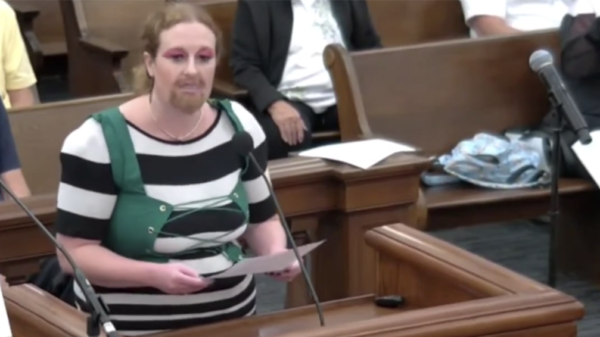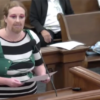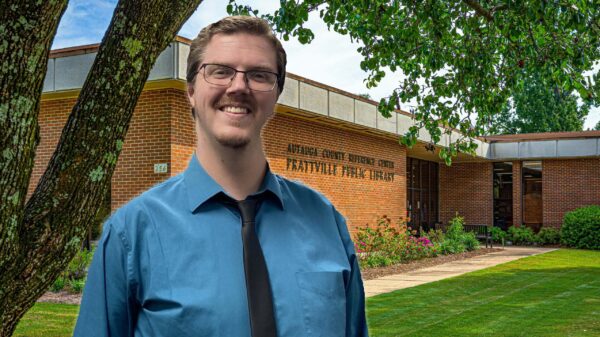Roy Moore took to the witness stand Thursday afternoon in his defamation trial against accuser Leigh Corfman.
Called to the stand by Corfman’s lawyers, Moore was immediately combative in his testimony.
When asked if he was concerned that voters would not see a “32-year-old man having sexual contact with a 14-year-old as appropriate,” Moore declared “the only thing inappropriate in this case is the testimony that I knew her and did anything to her.”
Corfman alleges that Moore initiated a sexual encounter with her when she was 14 and he was 32.
Judge John Rochester had to redirect Moore numerous times to answer the questions specifically as asked by Corfman’s attorney Melody Eagan.
Moore said most girls he dated at that time were “younger than I was” but that he “generally did not date girls in high school.”
“We did not date then as we date now,” Moore said. “I had friends, yes.”
After Moore stated the he did not remember dating any girl without the permission of her mother, Eagan questioned whether he would have asked another 30-year-old’s mother for permission to date them.
“It’s old-fashioned, but I consider it proper. Yes,” Moore replied.
Eagan pivoted and talked to Moore about his wife Kayla, who Roy Moore has said he first noticed at a dance recital about eight years before they met. They were married when she turned 24, making Kayla about 15 or 16 when he first took note of her.
“I remembered the funny name, the (initials) K.K.,” Moore said.
Eagan also needled in on the fact that Moore’s home at the time, a mobile home, was constantly changing. Moore testified that it was his hobby at the time.
“The house was changing every week,” Moore said. “That’s what I did.”
The constantly changing house could be used by prosecutors to explain inconsistencies between the different testimonies of the women who described visiting Moore’s house in the corresponding years. Eagan also pressed that Moore could not recall what his own house looked like in 1979 when asked in a 2019 deposition, Moore continued combatting that he found photographic evidence that refreshed his memory.
Moore often cited his lack of memory regarding the timeframe.
“It’s difficult to remember anything from 40 years ago,” Moore said.
Eagan returned to a familiar line of questioning that has been playing out throughout the trial: whether Moore called Corfman a “liar” in response to her allegations. Moore and his team have consistently pointed to his statements that called the allegations “false and malicious” and differentiate that from attacking Corfman’s character. Corfman has testified that her “veracity was impugned” by the constant denials.
Moore said he was very careful about his wording because he “knows what defamation is.”
Eagan also pointed out 26 defamation suits that Moore filed in response to the allegations and campaign ads, as well as the money being sought in the cases.
“I will let my attorneys handle that,” Moore said. “There’s no amount of money in the world that could compensate me for what I’ve been through, what my family has been through. I don’t care about money. I can’t be compensated. Ms. Corfman said I could be sitting in a seat in the Senate if I had just apologized. I would never apologize for something I did not do. My family, wife and children have been through hell. Literal hell.”
Before getting into the details surrounding the allegations, Eagan took Moore back through his prior controversies when he was twice removed as Chief Justice of the Alabama Supreme Court.
Moore was visibly upset and raised contentions about the questions but ultimately had to agree that he was removed from office for violating judicial ethics.
Eagan noted the defense has been referring to Moore as “Judge Moore” but pointed out that Moore was not a judge when the allegations took place nor when he was running for Senate, although Moore argued that he was a retired judge and the title was still relevant.
She also ran with a line that defense attorney Julian McPhillips told the mostly Black jury during his opening statement: that Moore was a “Democrat in disguise.”
Eagan played a video for the jury of Moore sharing his opinion that Barrack Obama was not born in the U.S. She also reminded Moore that he said in 2019 that “the agenda of the Democratic candidates for President would lead to the destruction of this country.”
“And I’ve said it about Republicans too,” Moore said.
Eagan also recalled a quote Moore said in 2017: “I think it was great at the time when families were united — even though we had slavery … black families were stronger.”
In possibly one of the angriest responses of the day, Moore said all families were stronger at that time.
“White families and black families have both failed in their responsibility because they’ve turned from God,” Moore said. “Not just black, not just white, and not just Republican or Democrat. I oppose slavery now and opposed slavery in the past. It is an anathema to our country.”
At the time of this testimony the jury was all black – the lone white juror was dismissed at the beginning of the day after being overheard telling a witness “nice job” after proceedings on Wednesday.
Moore will return to the witness stand this morning to be cross examined by his own counsel. Depending on Moore’s testimony, the prosecution could rest its case, or could call one more witness to the stand according to statements by the counsel to the judge.



















































